Empress Federica Pellegrini Extends Her Domestic Dominance Of Italian 200m Free As Undefeated Champion from 15 to 32 Years Of Age

Federica Pellegrini will head to her fifth Olympic Games this July not the favourite for the 200m freestyle crown but the living legend in the shoal of four-length freestyle history, after claiming a record 16th national title in 1:56.69 at the Spring Open in Riccione (rest of the fast action).
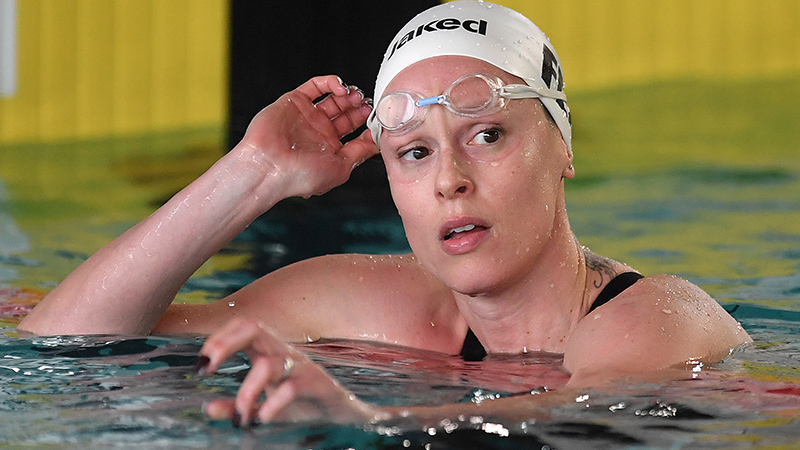
Closest to her were far away, 200m backstroke ace and medal hope for Tokyo 2020, Margherita Panziera was second on 1:59.13, the bronze to Stefania Pirozzi, on 2:00.38. Business as usual – all the way back to 2004, 2003 at the age of 14, the last time Pellegrini settled for anything but best.
Undefeated in Italian-Championship waters over 200m since 2003, when at 14 she claimed bronze, Pellegrini, 32, today celebrated her 16th victory in 19 times of asking (in 2008 and 2018 she opted not to race at Italian Spring Open Championships). Her winning ways started with her first Italian 200m record, 1:59.23, for victory at the 2004 Spring Open championships on the way to Olympic silver, on 1:58.22, just beyond her 16th birthday later that year.
Pellegrini’s 16th Open triumph and 44th-best effort of 55 career swims inside 1:57 also marked her 114th sub-2minute effort since that 2004 debut title and pioneering status at home, a part of that story her role as founder and captain of the Aqua Centurions International Swimming League Team (see archive below).
If ever there was a worthy recipient of the Lion of Venice prize it is Federica Pellegrini, a native of Mirano in the province of Venice and owner of one of swimming’s most stunning records: Olympic champion on 2008, she has made the World-Championships podium eight times, including four titles (the golds including the last two times of asking, in 2017 and 2019), three silver and one bronze.
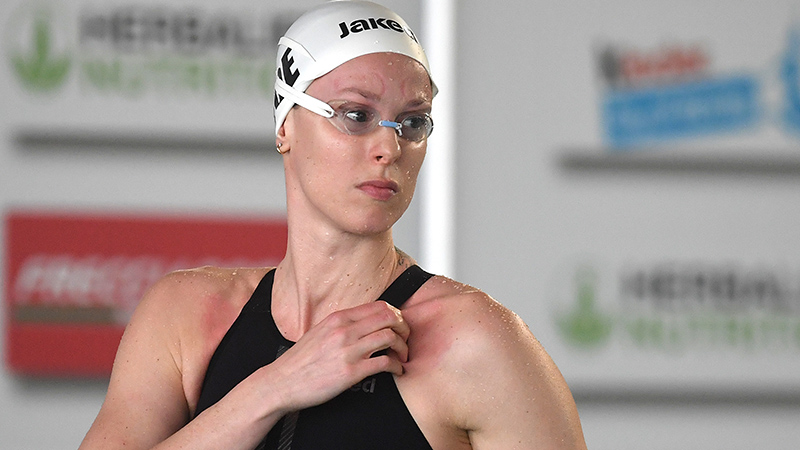
Pellegrini, coached by Matteo Giunta at the Verona performance centre and who last year was hit by Covid-19, was emotional after the race and qualification for a fifth Olympic Games, saying:
“Sorry for the tears, but it hasn’t been easy months. Swimming this time was not easy. I felt so much anger at missing the 100 (Tokyo target time, yesterday) by a tenth) but I made the limit for Tokyo today and that’s all the more beautiful because it was in my race. I’m completely happy. I’m in equilibrium with my other Italian championships and with the work I’ve been doing. Now I can breathe much better. I have made my fifth Olympics … I feel like crying again. “
Federica Pellegrini – image – in Riccione today – Photo © Andrea Staccioli/Deepbluemedia/Insidefoto, courtesy of FIN
The 200m Domestic Dominance Of Federica Pellegrini
A trawl Federica Pellegrini’s national Spring Open titles, 2003-2021, with notes on her rankings dominance, which includes her ownership of 83 of the top 100 Italian 200m freestyle efforts ever, including the 64 fastest efforts.
2021 – Riccione – Gold

2020 – Rome – 1:57.80 (as part of the Seven Hill Trophy due to Covid and postponement of spring championships); Riccione – 1:57.58 (winter nationals in December under Covid-19 restrictions)
- In June, Federica Pellegrini clocked 1:57.80 to win the 200m at the 57th Trofeu Sette Colli in Rome, the meet doubling as postponed Spring ‘Absolute”/Open Championships. In December, she clocked 1:57.58 for a 2020 World rankings of No12 in a year in which statistics can only be seen through the lens of the topsy turvy of the Covid-19 pandemic.
- By the end of 2020, Federica Pellegrini had the swiftest 64 times ever by an Italian after clocking the swiftest eight efforts by an Italian that year, Alice Mizzau now at 65 as Italian No2.
2019 – Riccione – Gold – 1:56.60
- World Championships, Gwangju – Gold – 1:54.22, 12 days shy of her 31st birthday and the first Thirty-something winner of the crown.
- By the end of 2019, Federica Pellegrini had the swiftest 64 times ever by an Italian after clocking the swiftest eight efforts by an Italian that year, Alice Mizzau now at 65 as Italian No2.
2018 – Riccione – DNS
- In 2018, Pellegrini gave 200m freestyle racing a rest, the national title lifted by Linda Caponi in 1:58.79. The end of Pellegrini’s 200 days? As if… 2019 she would;d make it four World titles from eight podiums
- Even so, by the end of 2017, Federica Pellegrini still had the swiftest 57 times ever by an Italian, Alice Mizzau still at 58 as Italian No2.
2017 – Riccione – Gold – 1:55.94
- World Championships, Budapest – Gold – 1:54.73
- By the end of 2017, Federica Pellegrini had the swiftest 57 times ever by an Italian after clocking the swiftest seven efforts by an Italian that year, Alice Mizzau now at 58 as Italian No2.

2016 – Riccione – Gold – 1:55.30
- Olympic Games, Rio 2016 – 1:55.18, 4th
- By the end of 2016, Federica Pellegrini had the swiftest 50 times ever by an Italian after clocking the swiftest nine efforts by an Italian that year, Alice Mizzau down to Italian No 51 all-time performance as second-fastest Italian ever
2015 – Riccione – Gold – 1:56.51
- World Championships – Kazan – Silver
- By the end of 2015, Federica Pellegrini had the swiftest 42 times ever by an Italian after clocking the swiftest seven efforts by an Italian that year, Alice Mizzau coming in at Italian No 43 all-time performance as second-best Italian ever, on a new PB of 1:57.37, and Chiara Masini Luccetti in at on 1:57.86 as third fastest Italian ever.
2014 – Riccione – Gold – 1:55.69
- European title – 1:56.01
- By the end of 2014, Federica Pellegrini had the swiftest 35 times ever by an Italian after clocking the swiftest three efforts by an Italian that year, Alice Mizzau coming in at Italian No 36 all-time performance as second-best Italian ever, on a new PB of 1:57.53.

2013 – Riccione – Gold – 1:56.51
- World Championships – Barcelona – 1:55.14 – Silver
- By the end of 2013, Federica Pellegrini had the swiftest 35 times ever by an Italian after clocking the swiftest seven efforts by an Italian that year, Alice Mizzau coming in at Italian No 36 all-time performance as second-best Italian ever, on a new PB of 1:57.91.
2012 – Riccione – Gold – 1:57.10
- The London Olympics produced no medals for Italy in the pool. Pellegrini’s season best 200m was 1:56.32, from Rome in June, after a 1:56.76 For European Gold in May. At London 2012, she clocked 1:56.73 for fifth as gold went to American Allison Schmidt in 1:53.61, a time that remains the swiftest ever in a textile suit. Some said this signalled the end of Pellegrini’s best 200m days. How wrong they were…
- By the end of 2012, Federica Pellegrini had the swiftest 32 times ever by an Italian after clocking the swiftest seven efforts by an Italian that year, Alice Mizzau coming in at Italian No 33 all-time performance as second-best Italian ever, on 1:57.95.
2011 – Riccione – Gold – 1:56.98
- World Championships, Shanghai – Gold – 1:55.58
- By the end of 2011, Federica Pellegrini had the swiftest 29 times ever by an Italian after clocking the swiftest 10 efforts by an Italian that year.
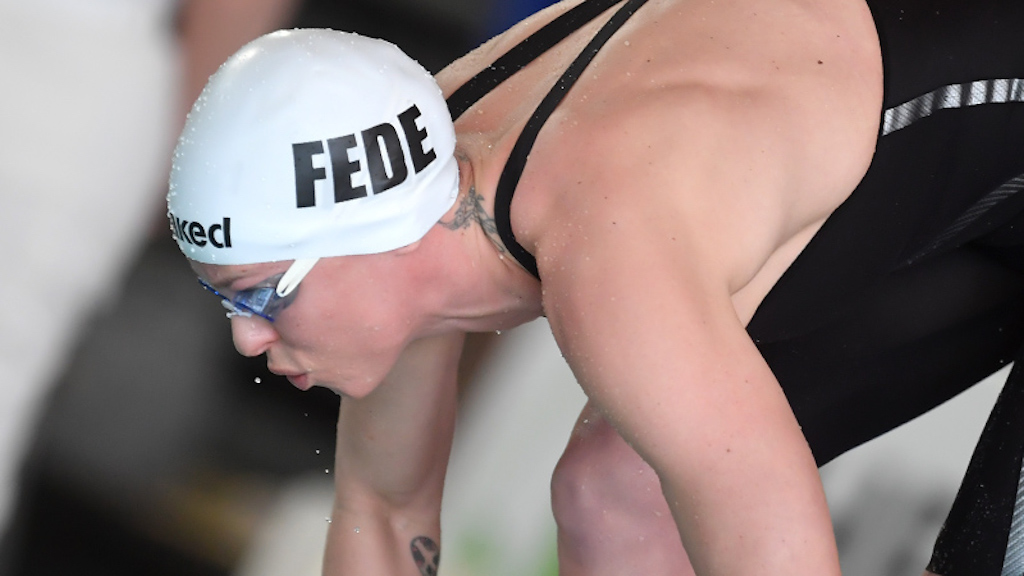
2010 – Riccione – Gold – 1:56.23
- European title – Gold – 1:55.45
- By the end of 2010, Federica Pellegrini had the swiftest 23 times ever by an Italian after clocking the swiftest seven efforts by an Italian that year, all but one inside the second-swiftest Italian ever, Spagnolo.
2009 Riccione – Gold – 1:54.47
- World Championships, Rome 2009, the height of the shiny suits circus – Gold, in what remains the World record, 1:52.98 … it was the last time she was guided and cheered on by coach Alberto Castagnetti, who died unexpectedly at 67 years of age a month after the Rome event.
- By the end of 2009, Federica Pellegrini had the swiftest 17 times ever by an Italian after clocking the swiftest five efforts by an Italian that year, all inside the second-swiftest Italian ever, Spagnolo.
2008 Livorno – Didn’t race at spring nationals
- 1:56.10 at the Seven Hills Meet in Rome in June in a month of three staged tests, the other efforts timed at 2:00.09 and 2:00.12 in local competition.
- Olympic Games, Beijing 2008 – Heats 1:55.45 World Record – Final, Gold – 1:54.82 World Record, eight days after celebrating her 20th birthday.
- By the end of 2008, Federica Pellegrini had the swiftest 12 times ever by an Italian, Renata Spagnolo coming in at No 13 on the all-time Italian list from her relay lead-off of 1:58.31 at Beijing 2008. That still left Pellegrini with the best four Italian efforts of the year.
2007 Livorno – Gold – 1:58.59
- World Championships, Melbourne – 1:56.97 – silver – after a World an Italian record of 1:56.47 in her semi, the final won by France’s Laure Manaudou at the height of her powers on a then staggering 1:55.52.
- By the end of 2007, she had the 24 swiftest times ever by an Italian and boasted the best 10 times in Italy that year.
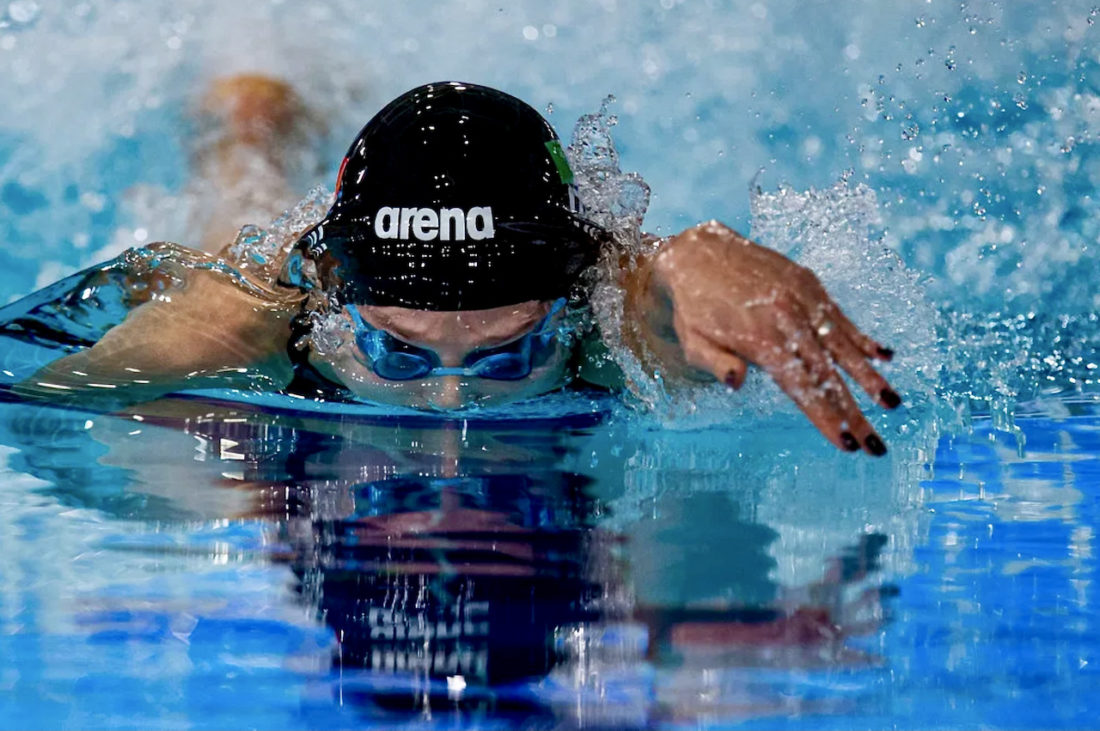
2006 Riccione – Gold – 1:58.57
- In 2006 Federica Pellegrini had company in the Italian sub-2-minute 200m freestyle club, Alessia Filippi on 1:59.26, Flavia Zoccari on 1:59.59. By the close of the year, Pellegrini had the best 16 times ever by an Italian, the annual ranks placing Filippi and Zoccari at 3 and 4. Competition begat response…
2005 Riccione – Gold – 1:57.92 – Italian record
- World Championships, Montreal – 1:58.73 – bronze
- By the end of 2005, she had the fastest 14 times ever by an Italian and the eight top times of the year in Italy.
2004 Livorno – Gold – 1:59.23 – Her first Italian record
- March 2004 – 1:59.23 her first Italian record and Italy’s first sub-2-minute effort, inside the 2:00.07 clocked at the Sydney 2000 Olympic Games by Sara Parise.
- In June 2004, at the Trofeu Sette Colli, she reduced the Italian record to 1:58.59.
- Olympic Games, Athens: silver in 1:58.22, after 1:58.02 Italian record in her semi. By the end of 2004, Pellegrini held the best five Italian 200m time in history and had the 9 best Italian efforts of 2004.
2003 Ravenna – 14 years old
- Bronze – . Racing for AS Serenissima Nuoto – 2:03.32, her new personal best and best that year.
From the Archive – 2019
When Federica Pellegrini Launched The Aqua Centurions As a League Pioneer
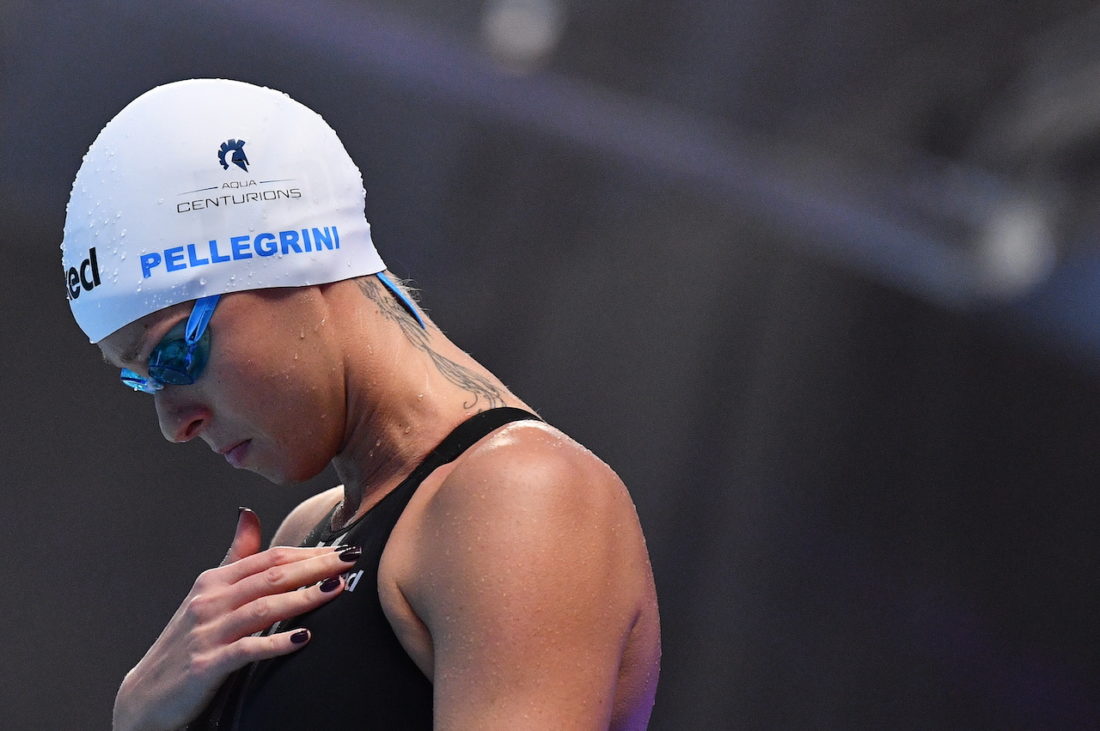
It was hard to tell who was more excited on the eve of the first-ever European round of the inaugural International Swimming League (ISL) this weekend: Federica Pellegrini or the City of Naples celebrating swimming royalty and the new gem in swimming’s crown of competitions.
One thing was certain: Aqua Centurions captain Pellegrini, 31, is the undisputed queen of the Italian waves. Cameras whirred, officials purred, the Lioness of Verona padded centre stage as Naples City Hall rolled out the red carpet for the country’s pool pioneer.
The Olympic champion of 2008 with a soaring record of eight straight podiums over 200m freestyle at World Championships, four titles among them, in her personal Pantheon, was thrilled to find herself not only a part of a swimming revolution but one that kicked off on this continent right here in her home country.
Pellegrini made her League debut with Aqua team-mates and rivals from three other squads in Indianapolis last week. On the eve of the first rematch in the six-round knockout event leaving to a showdown at the Final Match in Las Vegas two days out from Christmas, she said:
“I am so excited to have this great event in my country. This will be another world for us.”
One she knows very well from a time when all roads travelled by swim fans led to Rome and a 2009 World Championships from which she emerged with superstar status. Each of her golden swims in the 200 and 400m freestyle at the resplendent Foro Italico delivered a World record. That there were 43 of those in eights days somewhat took the shine off the value of what ought to be soaringly special moments.
There was a very dull side to shiny suits – and they had to go. Pellegrini remained and built the longest and most outstanding 200m freestyle career in swimming history, through thick and thin, including the death of her mentor, Alberto Castagnetti soon after he’d watched his charge wow the home crowd in Rome.
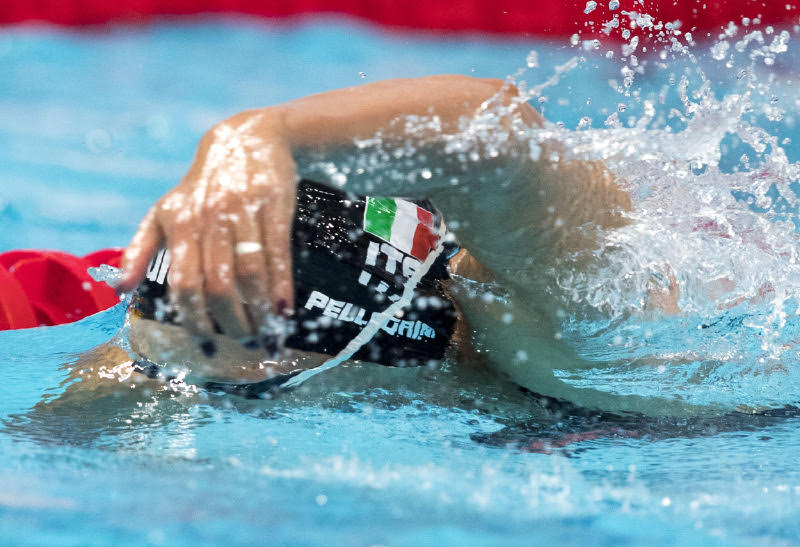
Not even Alberto might have imagined that a decade on, in 2019, Pellegrini’s fourth global long-course crown over 200m freestyle would make her the first swimmer in history to win eight consecutive medals in the same event at the world championships: four gold medals [2009, 2011, 2017, 2019], three silver medals [2005, 2013, 2015] and one bronze medal [2007].
Only Michael Phelps, 2000/1-2016, can claim to have got to the top and stayed there, consistently, at the very helm of his events and sport for so long. Imagine if we’d have seen Mark Spitz make it to the podium in 1984; or Matt Biondi at Sydney 2000; Janet Evans at Athens 2004; and Debbie Meyer at the 1984 Olympics and still making the medals.
Not quite. Different world, of course, not least of all now in this watershed of years for swimming. The League arrived with a pledge of a 50:50 share of revenues and a wage at the end of a season of regular racing that does not expect a world-record and peak performance with every passing “on your marks”.
The Clash Of Ages
The individual remains key but the emphasis is on team in a format that does not demand the presence of the biggest guns at every round. This weekend will witness the arrival of Caeleb The Condor Dressel for the Cali Condors, while one of his key rivals, Florent Manaudou, is among those who saw the League as alchemy for comeback and another Olympic campaign.
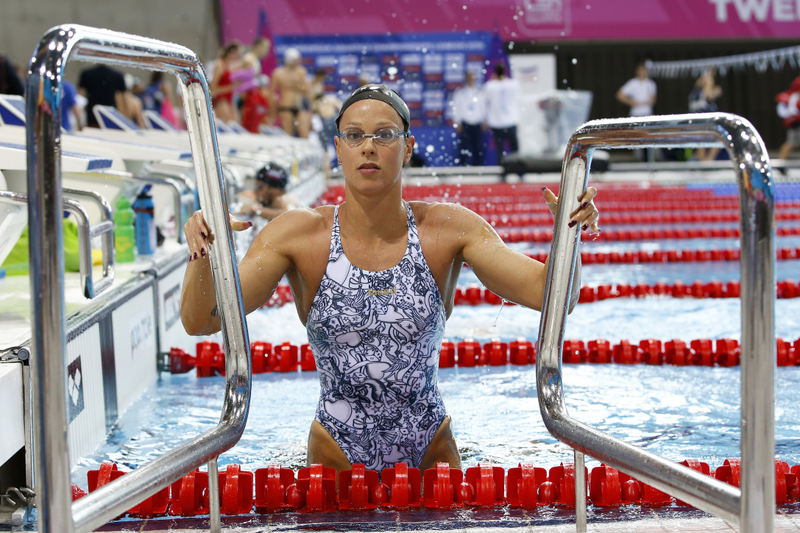
Manaudou contributed significantly, with victory in the skins, to Energy Standard‘s victory in Indianapolis. Enter Dressel and a dynamic shift for the Cali Condors that will require sharp tactical skills from head coaches, James Gibson, for Energy, and Gregg Troy for the Condors. Gibson’s take on round 1:
“We got the strategy right. Energy Standard had the best strategy in the field. The Cali Condors, on paper, looked exceptionally strong. Probably the strongest team out there. But I think we had a lot better strategy going into some of the races, especially the relays and the skins events at the end.”
Jason Lezak, the Team USA hero of Beijing 2008 when he cracked the French challenge to snatch gold from the jaws of defeat in the 4x100m freestyle and keep outer-orbiter Phelps on target for a record eight golds, is now general manager of the Condors. Looking back over his shoulder at last weekend, he said:
“It was interesting to see how it was going to play out for the athletes who had to do multiple events, and the strategy for the coaches of how many events to put them in. I think most of the teams did really well and they learned the first couple of sessions when athletes started getting tired. As the series progresses, I think we’re going to keep learning, and keep making changes to those lineups, and you’re going to see a lot of really, really good swimming.”
Dressel is the new sprint king on the blocks, while Manaudou, with 50m gold in 2012, has 2016 and silver to look back on and know that age is no barrier. Rio gold went to Anthony Ervin, at 35 the oldest Olympic swimming champion in history, 16 years after he shared the ultimate Olympic prize with U.S. teammate Gary Hall Jr. All those generations raced at a time of Phelps and a simple message they gone some way to rubber-stamping: “No limits”.
Pellegrini is another case in point. She claimed Olympic silver at Athens 2004 – yes, over 200m freestyle, ahead of gold four years on at Beijing 2008, the year before Rome honoured the empress of waves. Imagine then what we might have though had someone suggested that eight years on she would take on a swimmer who of the might and scope of Meyer to Shane Gould to Evans at the height of her powers – and win; and, in 2017, become the only woman to beat Katie Ledecky when it truly counted since the American started to build one of the greatest swim careers in history.
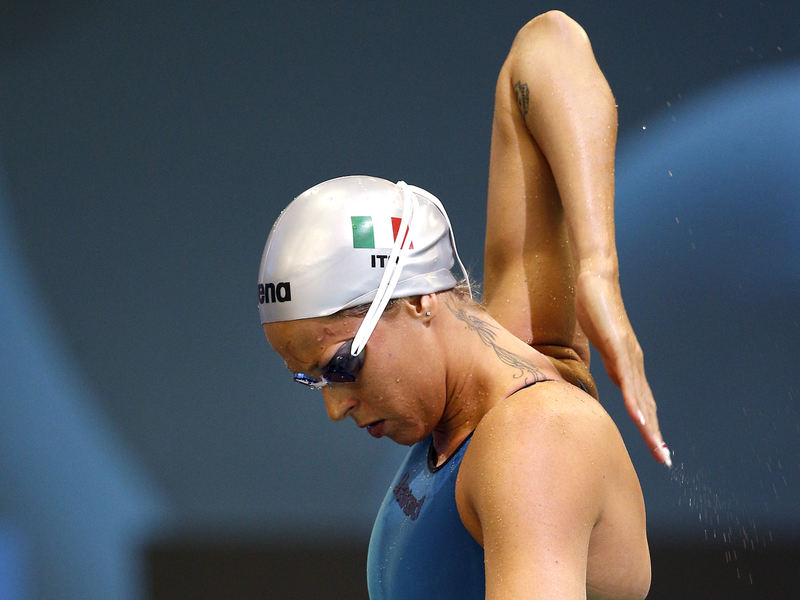
In 2017, there were two highlights for Pellegrini: she claimed the 200m World title anew at a time when Ledecky was 200, 400, 800m Olympic champion and 200, 400, 800 and 1500m World champion (and enduring that kind of schedule once more, fair to point out).
And then there was the original test event for the League and the Energy for Swim charity event in front of a packed and roaring crowd on a balmy night back at Pellegrini’s beloved Foro Italico.
Recalling the roar at the Foro in 2009, Pellegrini said:
“It will be amazing. We are ready to fight.”
They will need to: fourth in Indianapolis behind Energy Standard and Cali Condors out front and a touch or two adrift DC Trident, the Centurions have their work cut out if they’re going to make the cut of four multi-national teams that will make it to Las Vegas, two based in Europe, two in the U.S.
The weekend after this, London Roar and Team Iron will join the fray from Europe, with Australians and others bringing the fight to the NY Breakers and LA Current, all racing on teams with with erstwhile rivals who will become the competition once more upon return to traditional championship waters and at the Tokyo 2020 Olympic Games next July.
Teething Problems & ‘Transporting Emotions’
Today, ISL founder, funder and president Konstantin Grigorishin joined a panel discussion on sport and social health in Naples.
“Sports are very important in daily life. People learn basic values like friendship and respect in sports, its main objective is unity”, Grigorishin said, explaining that it was a pool at his school, that changed his life for the better when he was a young boy: “I fell in love with swimming and I still love it. This is what we want to do with this.”
Grigorishin was not able to attend the first meet in Indianapolis in person, but he liked what he saw on tv even though he acknowledged some bumps. He said:
“I anticipated some mistakes, this is the first time. And we did make some mistakes. But we will fix them. I am happy that we are on the right track. What I liked: The swimmers are happy, the dynamic of the competition is very good. The main thing that we wanted to do is transport emotions.”
That was not so hard to do: swimming, so long unchanged in basic shape form and format, has been awaiting this moment like a desert seed thirsts for rain.
The challenge now is whether the ISL and all its parts, including the athletes, can master the art of debrief and turn the green shoots of a swimming spring into a harvest that can fuel not just the athletes but the sport up the professional ranks to recognition beyond its own bath.